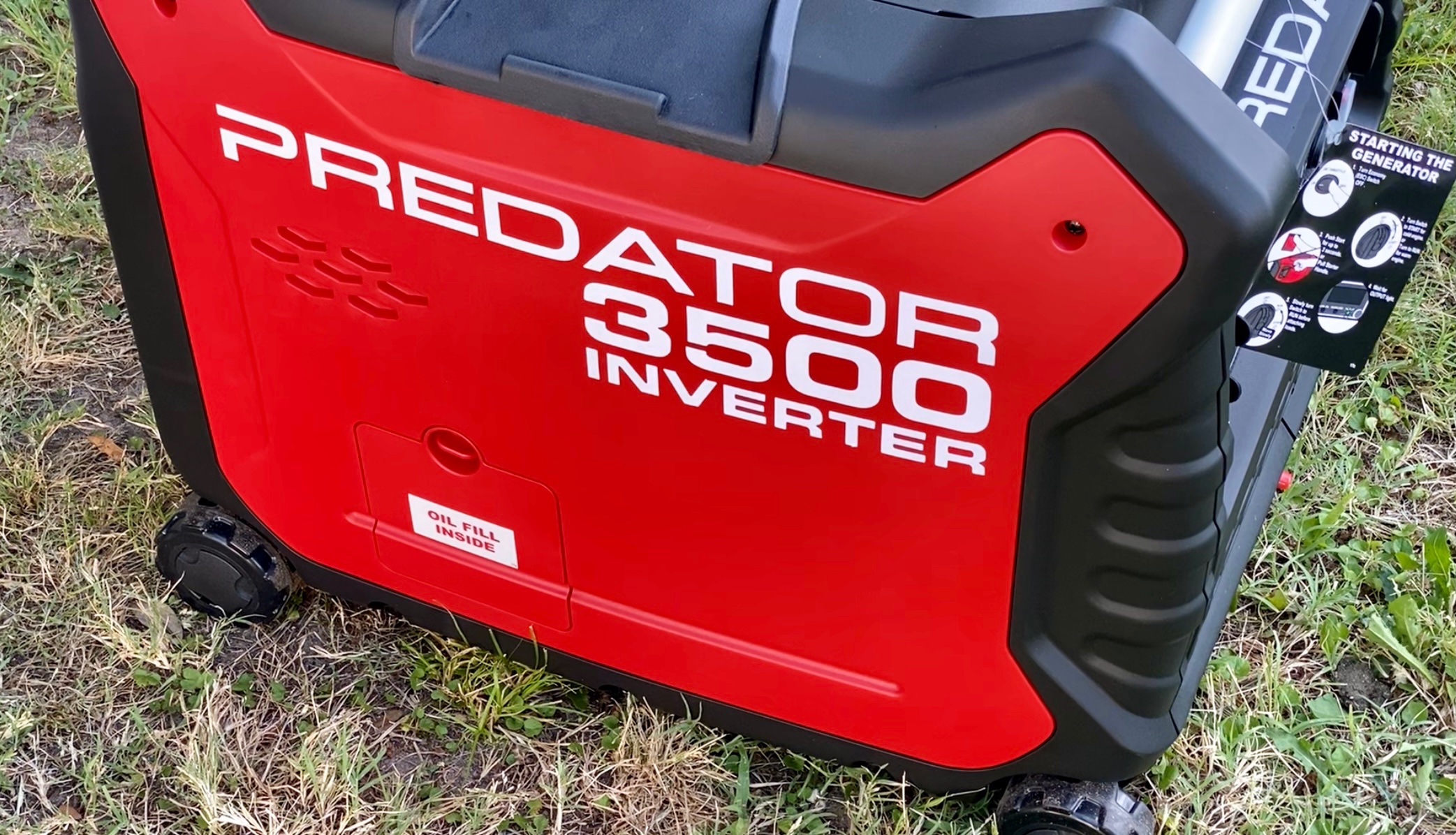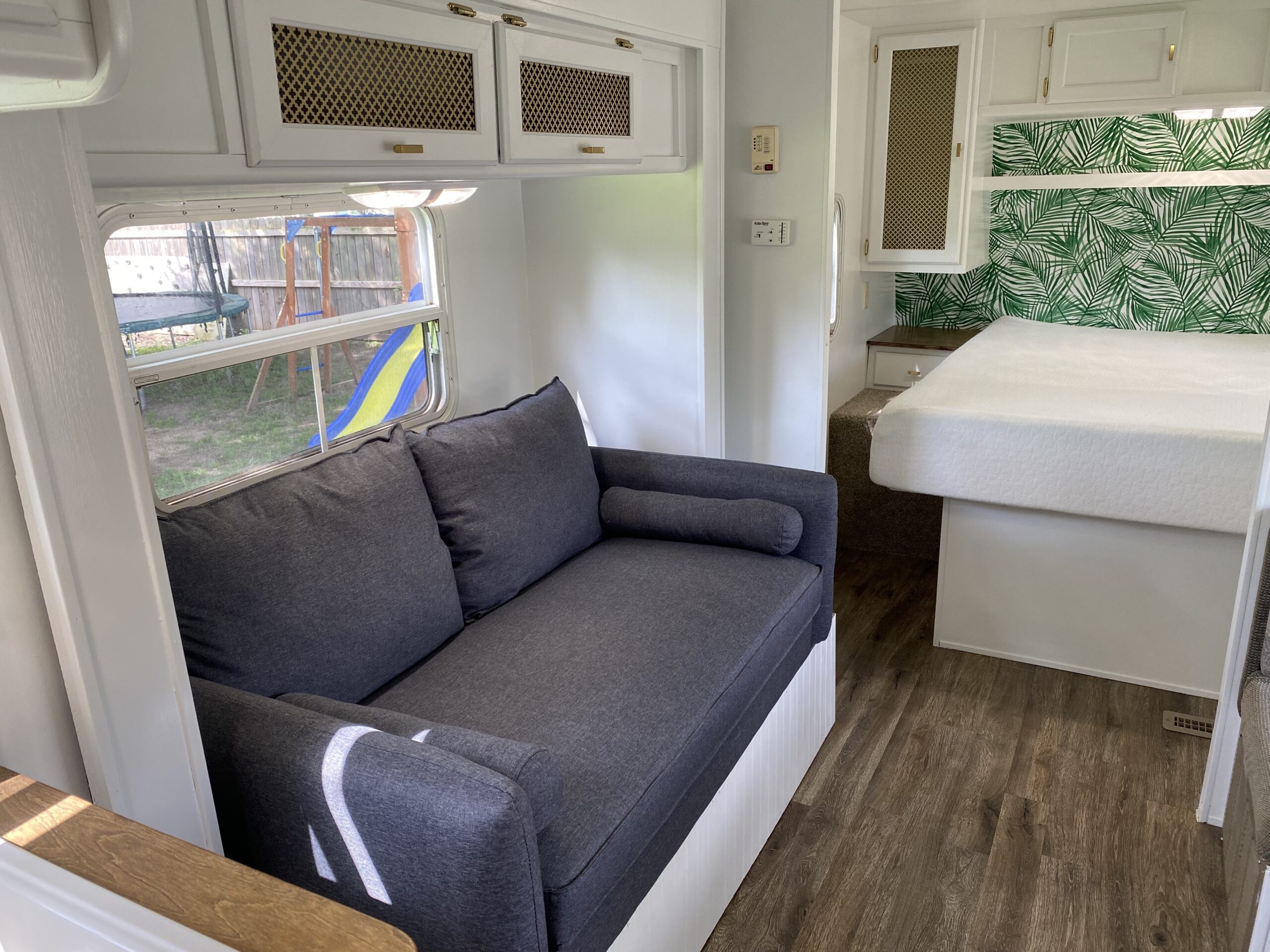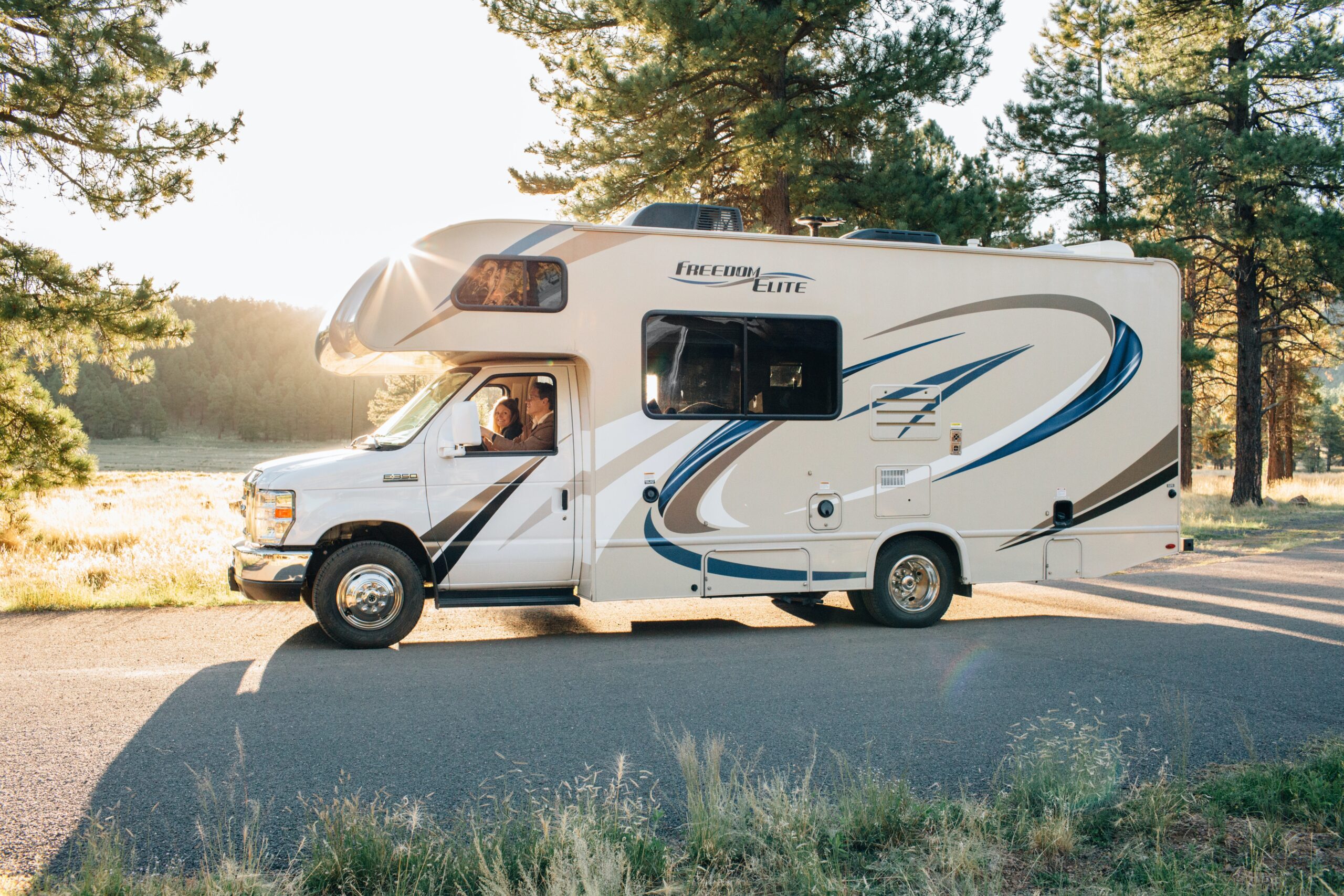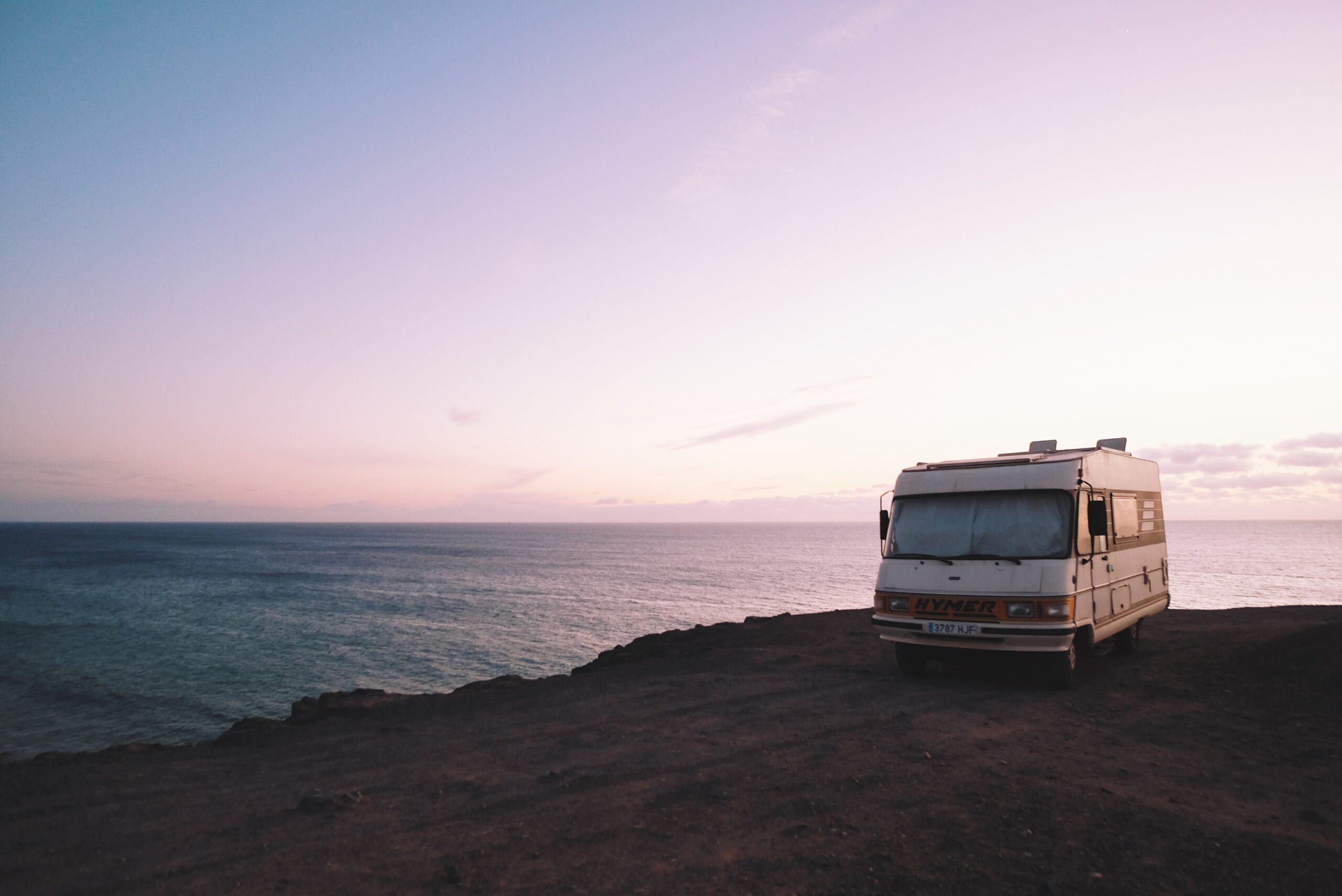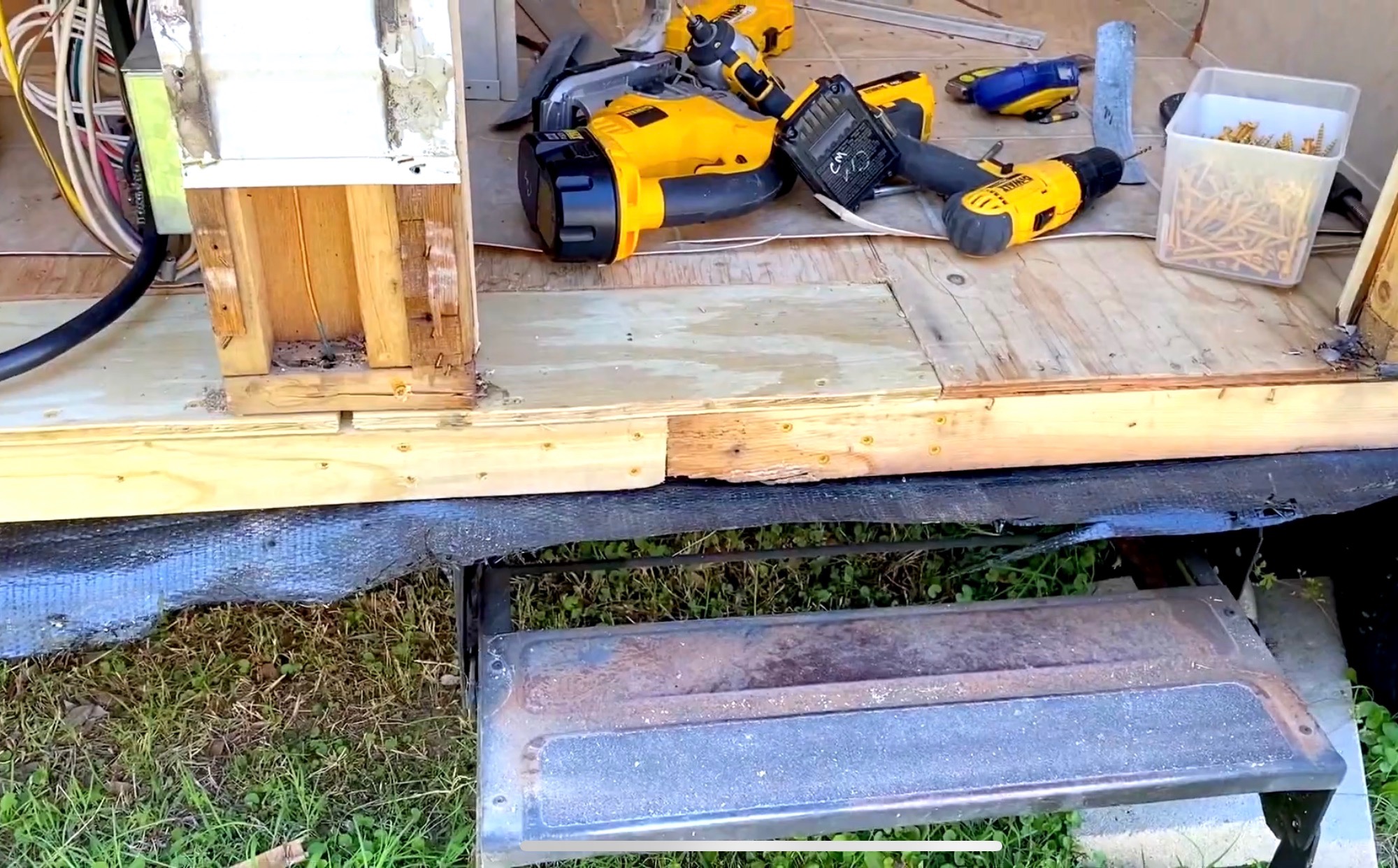However, each backup power option has its advantages and disadvantages, making it a challenge when choosing between them.
Depending on your power needs, a generator can be a great option as it is generally less expensive and can provide more power than an inverter. However, considering a generator’s constant need for gas, the amount of noise it produces, and its carbon monoxide exhaust, an inverter may be better.
As you read further in this article, you’ll discover the power sources available to you in your RV and get a better understanding of your RV’s electrical system.
We’ll take a comprehensive look at both power options to help you choose one that you’re your needs.
Power Sources in Your RV
One of the perks of owning a motorhome is the availability of power (electricity). Your RV is probably in a camp park or ground where electricity is supplied to every camper in the park through shore power.
What do you do if the shore power goes off? How do you handle your electricity needs when you have to go on an adventure where there is no one to supply you with the needed power?
Before we delve into answering those questions, it’s important to understand how your RV gets electrical power.
Shore Power
Shore power is one of the primary sources of power supply for RVs.
It is available in campgrounds and advanced and modern parks to provide electrical power to motorhomes so their appliances can be run and their batteries charged.
Shore power is also used in boats and ships when docked at the shores where they draw power from the marine’s primary grid.
House Batteries
Every electromechanical machine has a form of battery on which electrical energy is stored to power a start-up, keep the engine running, or power a machine component. The same applies to your RV.
You must have come across one or more batteries in your camper, and if you’ve thought it only helps in kick-starting your RV’s engine, you’re mistaken.
The batteries on your motorhome, most likely deep cycle, also helps to power some 12 volts appliances and power outlets in your RV.
These are batteries and therefore get depleted from time to time. If they are subjected to such use, how then do they get replenished? By charging them, of course.
When your RV is plugged into shore power, it charges your RV’s battery, and at the same time, powers your appliances and power outlets.
Power generators and inverters answer the challenge of getting electrical supply when shore power is unavailable. You don’t have to depend on shore power to run your RV appliances with inverters and generators.
However, a basic understanding of your RV’s electrical system is essential before you begin to use either a generator or inverter.
Understanding Your RV’s Electrical System
The first thing you should know is that your RV has three different electrical systems; the 12-volt DC coach system, 12-volt DC automotive system, and the 120-volt AC coach system.
Our focus will be on the 12-volt DC coach system and the 120-volt AC coach system.
You might wonder why there are different electrical systems in your RV. The reason is that your motorhome appliances have different power ratings and require different voltage levels to function optimally.
For instance, the roof air conditioner works with the 120 volts AC system because it cannot function with the 12 volts DC system, but the power outlets do.
As a result, your RV comes with a heavy-duty power cord that you can plug into a power source. This plug connects with a 120-volt AC system, the system available in campgrounds.
This plug then supplies your RV and every appliance in it with power, including the 12-volt rated ones such as bulbs.
One other thing to note is the term AC (alternating current) and DC (direct current). These terms will come in handy when we start discussing inverters and generators.
By now, you must have noticed that your RV uses both AC and DC.
It uses the DC system to run the battery and other electrical components while it uses the AC to run all electrical appliances.
Now that you have a basic understanding of how the electrical systems in your RV work, let’s get into the flesh of things.
Power Inverters: A Basic Overview
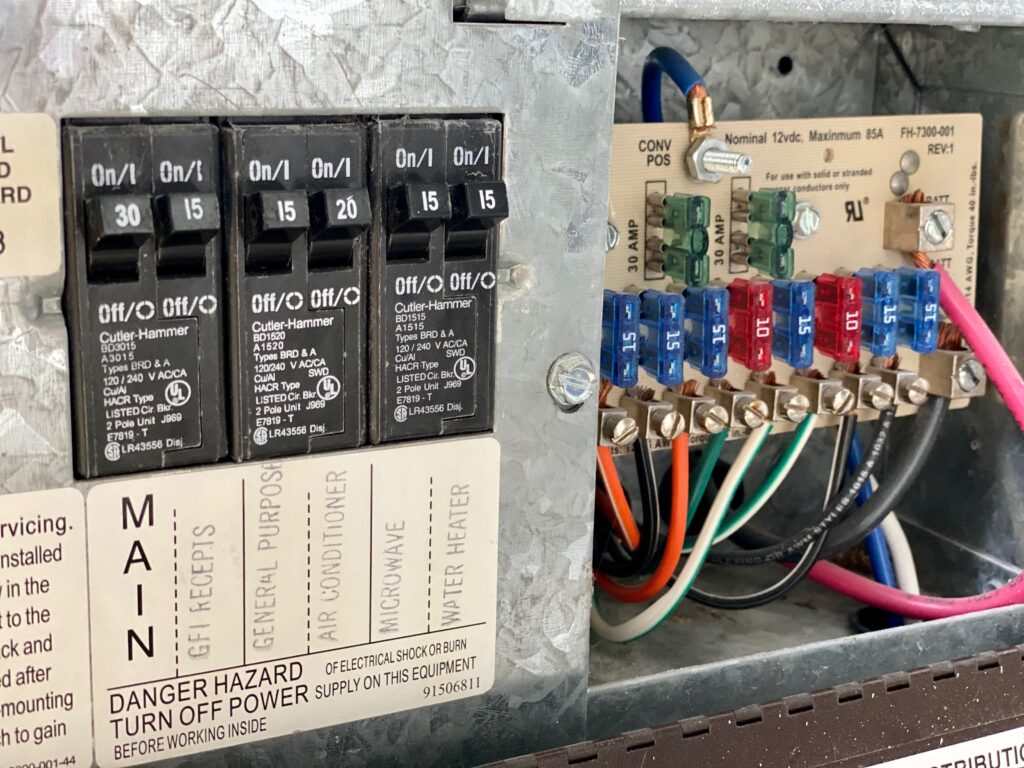
A power inverter, or simply, an inverter, is a device that converts direct current, DC, to alternating current, AC.
As the name suggests, an inverter turns electrical flows moving in a specific direction in other directions.
In other words, it changes a unidirectional flow of electric current into a multidirectional flow.
In an RV, power outlets, microwaves, and air conditioning run on AC, while televisions, fans, lightings, and water pumps run on DC.
An inverter is not a power generator. It only draws power from a DC source (in this case, your RV deep cycle batteries) and converts it to an AC type of electricity that some of your appliances run on.
This mechanics means that an inverter is useless if there are no batteries on which electrical energy has been stored.
Since inverters convert DC electricity into AC, how will you power your DC-reliant appliances like water pumps? A converter can help to get the job done.
As you would have guessed, it changes an alternating current back to a direct current.
What to Know Before Buying an Inverter for Your RV
You have power stored on your RV, yes. It’s right there in your battery.
The only way to use that stored power is by employing an inverter.
By now, you understand that your battery provides direct current, which powers a selected few of your appliances.
Other appliances that need alternating current do not necessarily have to be out of use in your RV when you don’t have shore power.
Here are a few things you should know and consider before you purchase that inverter you need.
Power Consumption
Before buying an inverter, you need to know how much power you consume daily and how you consume them.
You can do this calculation when your motorhome is plugged into an AC outlet, like the ones at campgrounds.
The best way to calculate this is to multiply the amps of an appliance with the AC volt of your RV, usually 120 volts.
For instance, you can know the power rating of an appliance that’s working at 0.8 amps by multiplying the amps by the volts; 0.8 x 120, which gives you 96 watts.
To get the total wattage, repeat the same process for all appliances that draw power when your inverter is running.
Once you know the total wattage your appliances need to run, add 15% of that value to your total.
With the derived figure, you can now decide on the power rating your ideal inverter should have.
Battery Power
An inverter doesn’t power your appliances on its own; it needs a battery or a series of batteries to do that.
Therefore, it is crucial that the batteries that store DC electricity in your RV be powerful enough to keep your appliances running.
On your battery, there is usually a map-hour rating written on it.
This rating lets you know how long the battery can power your appliances at a particular amp.
To know how to calculate your battery power, divide the wattage of your total appliances by 10.
The value you derive influences the rating of the inverter you should purchase.
The battery power influences how long the inverter will run.
If your appliances have a total current need of 20 amps, and your battery is rated 180 amps/hour (usually written as 180 Ah), divide the battery Ah rating by the total current need.
In this case, you will have 9, meaning your inverter will run for approximately 9 hours.
Waveform Output
Inverters render AC output in two ways; pure sine wave and modified sine wave.
An inverter whose output gives a modified sine wave can power a broad range of appliances, especially those requiring high current.
They, however, do not power some instruments that can easily, such as water pumps.
For this reason, these types of RV inverters are less expensive.
Inverters that produce pure sine waves, on the other hand, are costlier and can be used to power any appliance in an RV.
They can power digital devices without causing any interference.
Pros of Using an Inverter in Your RV
- Noise Level: One of the significant advantages of inverters over generators is the reduction of noise. Inverters are relatively silent and less of a nuisance to neighbors, even you, the owner. The reason why inverters are quieter is because of their mechanics and how they are designed. This reduction in noise levels is one of the reasons behind its common usage indoors.
- Environmentally Friendly: Inverters don’t have adverse effects on the environment, as some generators do. It doesn’t pollute the environment with its exhaust as it doesn’t have any. Its environmental friendliness is the other reason for its suitability for indoor and motorhome use.
- Compact and Portable: Inverters suitable for use in an RV are usually small, lightweight, and easy to carry around. They are generally not as big as fuel-based generators regardless of their power ratings.
- Size: Its size and weight make it easy to carry around and used almost anywhere. You can be on a boondocking trip and have a steady electricity supply. You can enjoy the silence of the woods and chirping of the birds in your RV while your fan, powered by your inverter, wards off the summer heat.
Cons of Using an Inverter in Your RV
- Cost: Quality inverters don’t come cheap. Depending on the power rating you choose, inverters are more expensive than generators. This price difference means that the higher your total power need in an inverter, the more you’ll spend on getting one. However, this cost can be reduced if you leave some appliances unused. It means you’ll need an inverter with less power rating and, consequently, less price.
- Lesser Power Rating: Despite an inverter’s expensive nature, it does not match a generator in power rating, for instance, a diesel engine generator. For an RV, depending on its owner’s appliances and is willing to use it at a go. Regardless of an inverter’s power rating, the source battery’s quality and charge determine how long it lasts.
- Efficiency: An inverter doesn’t generate electricity. It converts electricity from one form to another. From our fundamental knowledge of matter and energy, we know that a percentage of energy is lost during energy conversion from one form to another. Therefore, when DC is converted to AC, a portion of the electrical charge is lost as heat.
Generators: A Basic Overview
Electric generator, power generator, power plant, or simply generator is a device that converts mechanical power to electrical power.
The electrical power thus generated is supplied to electrical circuits. Electric generators convert fuel, gasoline, diesel, or propane to electrical energy through the movement of parts of its engine.
A typical generator has the static part, called the stator, and the motive part called the rotor. One of these two parts produces a magnetic field.
Similarly, the other part, consisting of wire wound around it, generates an electric current due to the motion.
There are three types of generators, and they are categorized based on different criteria. Based on fuel, they are classified into gasoline, diesel, and propane generators.
Also, there are portable generators, inverter generators, and standby generators with respect to their sizes.
Portable Generators
These types of the generator are powered by gasoline, diesel, or propane.
They are excellent sources of backup electricity. They typically provide power using combustion engines and are very adaptable, especially in remote areas.
They are capable of powering different appliances, depending on their power rating.
Inverter Generators
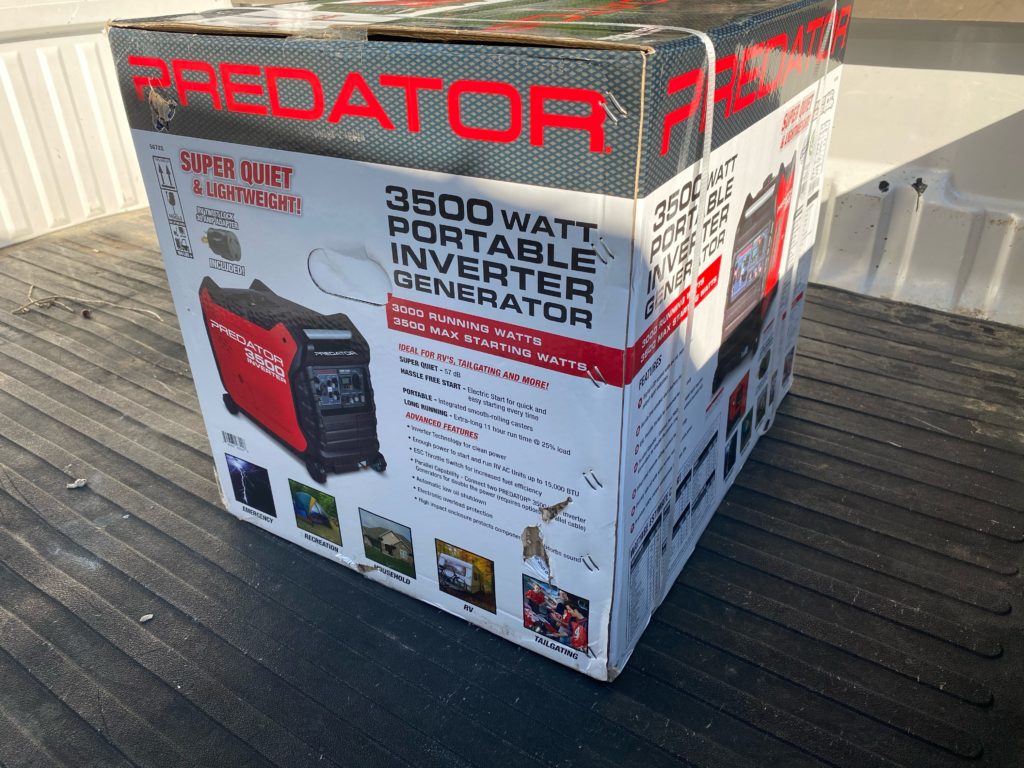
Inverter generators are sophisticated options of backup power.
They provide electricity by transferring electrical energy produced by an alternator to produce alternating current.
Unlike other generators, it can successfully convert its alternating current into direct current, using a rectifier, and converting it back to alternating current.
In other words, it enables you to use the current from an alternator.
Inverter generators are suitable for powering individual appliances, a group of appliances, and even whole buildings.
Standby Generators
These are best suited for emergency purposes in hospitals and manufacturing industries that are liable to incur a loss due to sudden power outages.
They have automatic switches that transfer power from on-grid to emergency backup power. They can operate on propane or natural gas.
Do You Need a Generator for Your RV?
Well, the answer depends on you and your electrical needs.
If your motorhome is one from the oldies, chances are it is not equipped with appliances and gadgets that campers have today.
If you do not wish to upgrade your trailer, you have no real need for a generator.
However, if you have all the appliances that bring indoor comfort outdoors with you on your adventure, you need a backup power source, and a generator is a great option.
Choosing the Right Generator for Your RV
Every RVer’s electrical needs vary. If you’re considering buying a generator, chances are you don’t have enough electrical power as you would have liked.
No matter the type of generator you’re considering, here are some things to consider before choosing one:
- Size: It’s a well-known fact that space is luxury to an RVer. So, you can’t afford to buy a generator that occupies more space than it needs to. For this reason, it’s best to choose a generator that will fit perfectly in your RV. We recommend taking measurements in your RVs compartment before heading to the store.
- Power Consumption: You want to make sure you purchase a generator that can power all the appliances you would use simultaneously in your RV. Calculate your power needs appropriately, and buy a generator that meets your requirement. Refer to the guide on the power rating calculation provided earlier in the article.
- Fuel Type: As mentioned earlier, you can choose a generator that either uses propane, gasoline, or diesel as fuel. However, it is recommended that your generator uses the same fuel as your RV. This helps you gauge your fuel use and saves you the stress of hauling fuel in cans. Also, choose the generator that uses fuel readily available on routes you ply.
Pros of Using a Generator for Your RV
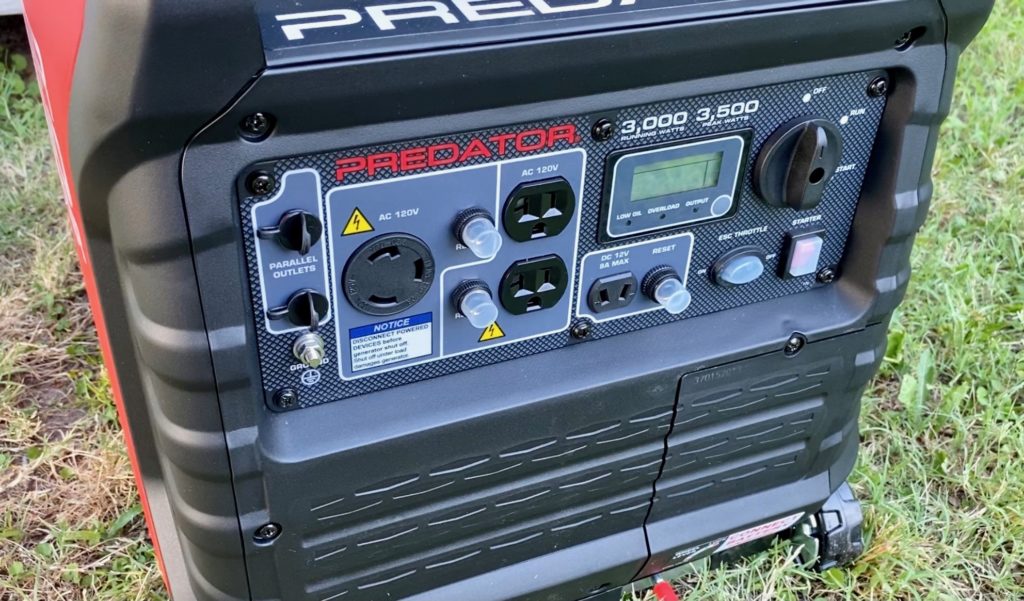
- Dependable Back-Up Power Source: When your primary power source is out, or you have to embark on a long journey, the generator becomes your primary electricity source.
- Power Source for Your RV’s Batteries: Just as the shore power charges your RV battery while it powers your RV and your appliances, the generator does the same. It replenishes your battery, making it ready for use when you’re without supply from the generator.
- Versatile: Generators are excellent when it comes to versatility. They can power everything in your RV as long as you purchase one compatible with your needs. You can also choose to cut down on appliances you use at a time or use them all.
- Efficiency: Generators are efficient. They convert mechanical energy into electrical energy in a closed system. Although they give a percentage off as heat, they give as much as 95% efficiency, a little more than inverters.
- Price: One reason why a generator may be more suitable is its price. Generators are generally less expensive than inverters.
Cons of Using a Generator for Your RV
- Noise: Yes, the annoying droning sound that accompanies the working of the generator is its biggest letdown. It makes it somewhat unsuitable to use in parks and campgrounds as it disturbs the neighboring campers. However, more silent options are available.
- Pollution: In terms of safety and human health, generators may be less suitable. Generators give off carbon monoxide, which is toxic. This environmental hazard is one reason why gasoline and diesel portable generators are mostly suited for outdoor use.
- Weight: Generators may be portable and small, but that doesn’t mean they are the easiest to move around. Unlike inverters that draw power from batteries, generators produce energy entirely in its engine. Therefore, every component used for this purpose is in the same casing, making it considerably heavy.
Conclusion
Living off-grid, on the road, and away from the comfort of a traditional indoor home doesn’t have to be made more unbearable by lack of electricity.
Calculate your electrical needs and choose an inverter or generator to provide you the needed comfort your electrical appliances give.
You can also own an inverter and a generator at the same time. The generator powers your RV when you’re stationed in a place, and your battery is drained.
When the generator is off, the inverter can start its turn of work by powering selected appliances in your RV.

